wimpel69
10-30-2016, 01:13 PM
Please request the FLAC links (including the covers
and individual booklets) in this thread. PMs will be ignored!
These are my own rips. Please do not share my material further, also please
add to my reputation!
Born in 1905, William Alwyn was among the large group of post-Romantic English composers who gained
popularity in the wake of Ralph Vaughan Williams and Gustav Holst. A prolific composer, as well as a flautist
and teacher, he worked successfully in various forms and idioms.
Alwyn was educated at the Northampton Grammar School, where he proved a promising student in both music
and art. He attended the Royal Academy of Music from 1920 to 1923, by which time he had settled on composition
as his main interest in life. His studies were interrupted by the death of his father when he was eighteen, and he
was forced to go to work. He taught in a preparatory school and made the rounds of theater orchestras as a
flautist before returning to the Academy three years later as a composition teacher. Alwyn's own breakthrough
as a composer took place in 1927, when Sir Henry Wood conducted the premiere of his Five Preludes for
Orchestra at a promenade concert in London. His Piano Concerto was finished in 1930, and his oratorio,
a setting of The Marriage of Heaven and Hell by William Blake, was completed in 1936. Despite many
honors and awards, Alwyn abruptly abandoned all of his early works in 1939, regarding his technique
as inadequate.
Alwyn turned to neo-classicism in the 1940s, and found inspiration for a resumption of his career. His later
work included five symphonies, the first dating from 1949, two concerti grossi, a series of four Scottish
Dances, and several programmatic orchestral works including the symphonic prelude The Magic Island,
the gorgeous and haunting Lyra Angelica for harp and strings, and Autumn Legend, as well as a pair of
string quartets and other chamber pieces, and the operas The Libertine and Miss Julie. His seventy film
scores include Penn of Pennsylvania (1941), Green For Danger (1946), Odd Man Out (1946), The Fallen
Idol (1948), and The Rocking Horse Winner (1950), as well as many documentaries. He was made a
Fellow of the British Film Academy. In 1955, Alwyn gave up his teaching position, and from 1961
onward pursued composition virtually exclusively. In 1978, he was knighted. Alwyn died in 1985.
There was something of an Alwyn renaissance in the 1970s, both in performance and a series of
landmark recordings by the London Philharmonic Orchestra, conducted by the composer himself,
for the Lyrita label. In the 1980s and 1990s, younger conductors on other labels -- most notably
Chandos -- began recording the symphonies and other orchestral works.
Alwyn's music is melodic and eminently accessible, if not always as adventurous as modern listeners
might expect. His tunecraft could be both subtle and profound, as in The Magic Island (inspired by
Shakespeare's The Tempest and the Lyra Angelica, both compelling visions of beauty and mystery
that rank among the finest pieces of program music of their era. His symphonies are plainer and dryer,
but only slightly less attractive, with beautiful scoring and great technical vitality. All of these
pieces were often regarded as out-of-date in the relentlessly avant-garde world of contemporary
music at the time they were published, and they were largely ignored outside of England at the time.
With the rebirth of interest in twentieth-century English music, however, Alwyn's work has gradually
been finding a wider audience since the 1980s.
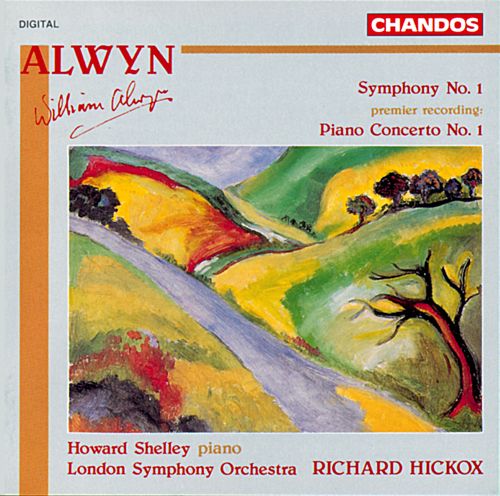
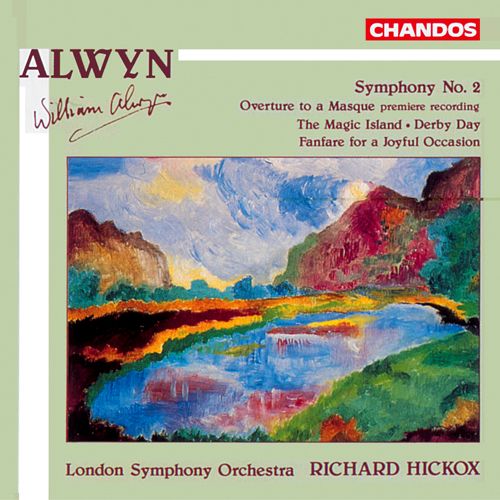
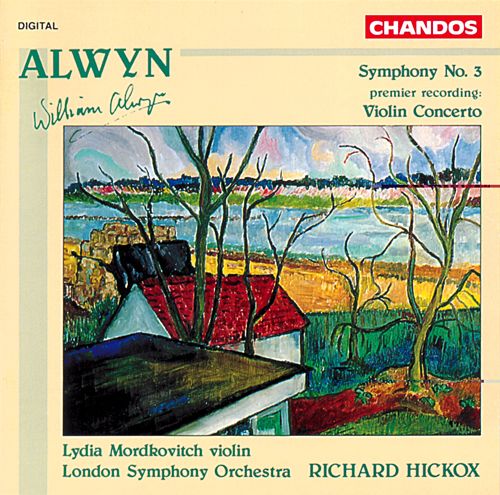
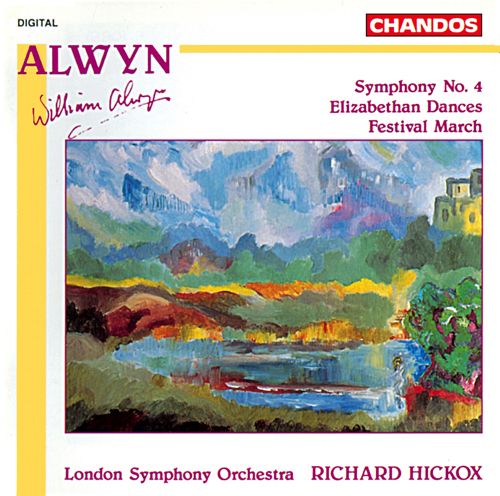
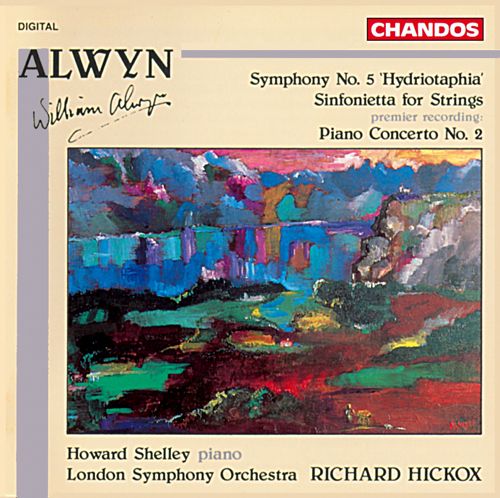
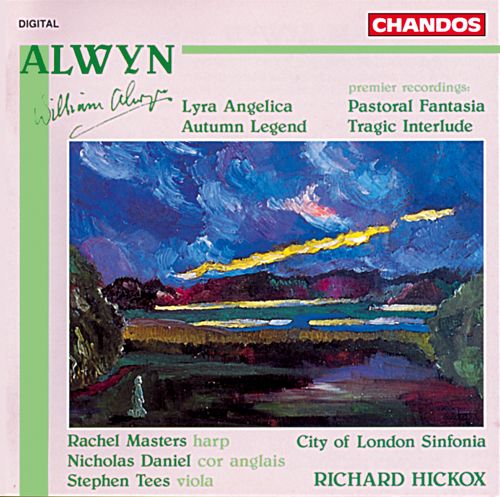
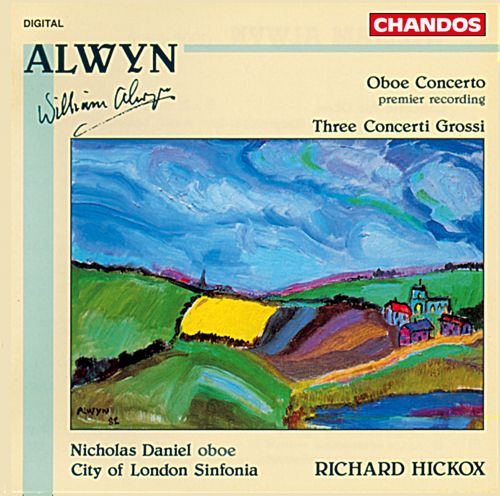
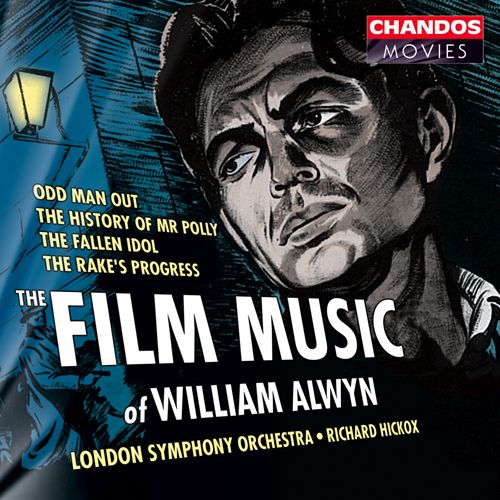
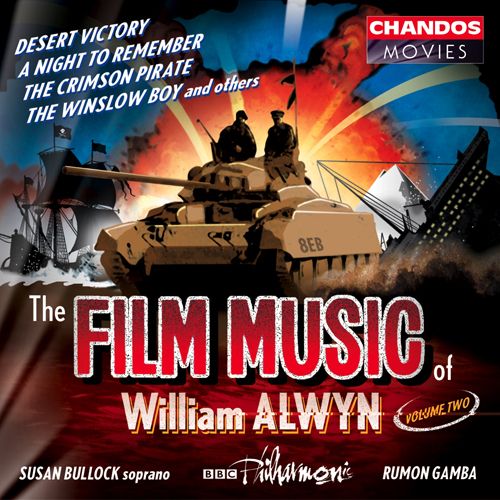

Music Composed by
William Alwyn
Played by the
London Symphony Orchestra
City of London Sinfonia
With
Lydia Morkovitch (violin)
Howard Shelley (piano)
Rachel Masters (harp)
Nicholas Daniel (cor anglais & oboe)
Stephen Tees (viola)
Conducted by
Richard Hickox
Rumon Gamba
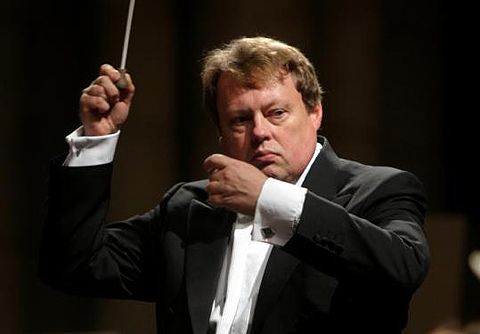
Richard Hickox was one of the most active and well-known conductors in Britain, with a strong international
reputation, especially for performing music of his native country. He began conducting at the age of 16 and, after
studies at the Royal College of Music and Queen's College, where he was an organ scholar, he founded the City
of London Sinfonia in 1971, of which he remained musical director until his death.
In 1972 he became organist and master of music at St. Margaret's Church, Westminster, remaining in that position
until 1982. In 1977 he was appointed conductor of the London Symphony Orchestra Chorus, and in 1982 became
the music director of the Northern Sinfonia in Newcastle-upon-Tyne. He is credited with re-establishing that orchestra
as an ensemble of stature, confirmed by a highly successful tour of the United States and a complete Beethoven
symphony recording cycle for the ASV label. He was associate conductor of the San Diego Symphony Orchestra
from 1982 to 1985, and took the same title at the London Symphony Orchestra in 1985. He shared leadership
duties with Simon Standage for Collegium Musicum 90, a period-instrument group the two founded.
All this activity made Hickox a very familiar face on the British music scene. With his various choral and orchestral
ensembles he frequently appeared at the major British music festivals and at the BBC Proms Concerts. He participated
in several notable special projects, including a BBC video production of Purcell's Dido and Aeneas and an appearance
in the Istanbul Festival leading a production of Mozart's The Abduction from the Seraglio inside the actual sultans'
seraglio in the Topkapi Museum. He also provided music for a Ken Russell film for the BBC on the wives of great
composers.
In the 1990s he increased his involvement with opera, leading new productions of Handel's Julius Caesar in Berlin,
Walton's Troilus and Cressida in a live BBC broadcast of an Opera North production, and Vaughan Williams'
Pilgrim's Progress at the Royal Opera House, Covent Garden. He conducted a televised production of Britten's
Turn of the Screw on the BBC in 2004.
He guest conducted around the world, including frequent appearances with the Los Angeles Opera and the New
Japan Philharmonic in Tokyo. He made over 300 recordings and won numerous awards, including a Gramophon
Award in 1992 for his account of Britten's War Requiem, and three Gramophone Awards, a Diapason d'Or, the
Deutsche Schalplattenpreis, and a Grammy for his recording of Britten's Peter Grimes in 1995 on the Chandos
label, probably the most honored classical recording of the last quarter of the twentieth century. His recordings
appeared on the ASV, Argo, EMI, and Virgin labels, and in the early '90s he had been an exclusive Chandos artist.
More recording awards were received in 2001 and 2006 for the music of Vaughan Williams and Stanford,
respectively. In 2005, he was appointed director of the Opera Australia. Hickox died of a heart attack following
a recording session in Wales in November 2008.
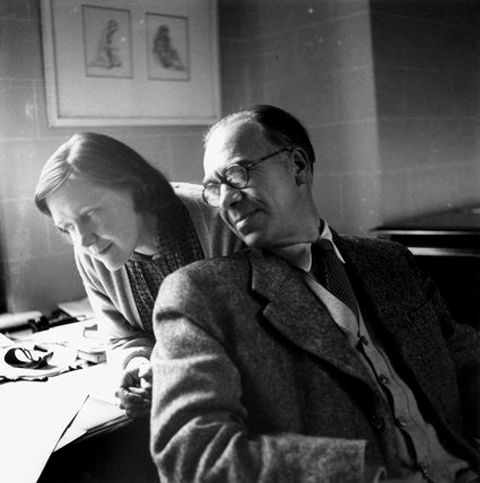
William Alwyn and his wife Mary Alwyn (aka Doreen Carwithen).
Source: Chandos Records CDs (My rips!)
Quality: FLAC 16-44 files (each disc incl. cover & booklet)
File Sizes: 236 MB / 271 MB / 325 MB / 294 MB / 306 MB / 340 MB / 343 MB / 349 MB / 264 MB / 262 MB
Total Size: 2.9 GB
Please request the FLAC links (including the covers
and individual booklets) in this thread. PMs will be ignored!
These are my own rips. Please do not share my material further, also please
add to my reputation!
and individual booklets) in this thread. PMs will be ignored!
These are my own rips. Please do not share my material further, also please
add to my reputation!
Born in 1905, William Alwyn was among the large group of post-Romantic English composers who gained
popularity in the wake of Ralph Vaughan Williams and Gustav Holst. A prolific composer, as well as a flautist
and teacher, he worked successfully in various forms and idioms.
Alwyn was educated at the Northampton Grammar School, where he proved a promising student in both music
and art. He attended the Royal Academy of Music from 1920 to 1923, by which time he had settled on composition
as his main interest in life. His studies were interrupted by the death of his father when he was eighteen, and he
was forced to go to work. He taught in a preparatory school and made the rounds of theater orchestras as a
flautist before returning to the Academy three years later as a composition teacher. Alwyn's own breakthrough
as a composer took place in 1927, when Sir Henry Wood conducted the premiere of his Five Preludes for
Orchestra at a promenade concert in London. His Piano Concerto was finished in 1930, and his oratorio,
a setting of The Marriage of Heaven and Hell by William Blake, was completed in 1936. Despite many
honors and awards, Alwyn abruptly abandoned all of his early works in 1939, regarding his technique
as inadequate.
Alwyn turned to neo-classicism in the 1940s, and found inspiration for a resumption of his career. His later
work included five symphonies, the first dating from 1949, two concerti grossi, a series of four Scottish
Dances, and several programmatic orchestral works including the symphonic prelude The Magic Island,
the gorgeous and haunting Lyra Angelica for harp and strings, and Autumn Legend, as well as a pair of
string quartets and other chamber pieces, and the operas The Libertine and Miss Julie. His seventy film
scores include Penn of Pennsylvania (1941), Green For Danger (1946), Odd Man Out (1946), The Fallen
Idol (1948), and The Rocking Horse Winner (1950), as well as many documentaries. He was made a
Fellow of the British Film Academy. In 1955, Alwyn gave up his teaching position, and from 1961
onward pursued composition virtually exclusively. In 1978, he was knighted. Alwyn died in 1985.
There was something of an Alwyn renaissance in the 1970s, both in performance and a series of
landmark recordings by the London Philharmonic Orchestra, conducted by the composer himself,
for the Lyrita label. In the 1980s and 1990s, younger conductors on other labels -- most notably
Chandos -- began recording the symphonies and other orchestral works.
Alwyn's music is melodic and eminently accessible, if not always as adventurous as modern listeners
might expect. His tunecraft could be both subtle and profound, as in The Magic Island (inspired by
Shakespeare's The Tempest and the Lyra Angelica, both compelling visions of beauty and mystery
that rank among the finest pieces of program music of their era. His symphonies are plainer and dryer,
but only slightly less attractive, with beautiful scoring and great technical vitality. All of these
pieces were often regarded as out-of-date in the relentlessly avant-garde world of contemporary
music at the time they were published, and they were largely ignored outside of England at the time.
With the rebirth of interest in twentieth-century English music, however, Alwyn's work has gradually
been finding a wider audience since the 1980s.










Music Composed by
William Alwyn
Played by the
London Symphony Orchestra
City of London Sinfonia
With
Lydia Morkovitch (violin)
Howard Shelley (piano)
Rachel Masters (harp)
Nicholas Daniel (cor anglais & oboe)
Stephen Tees (viola)
Conducted by
Richard Hickox
Rumon Gamba

Richard Hickox was one of the most active and well-known conductors in Britain, with a strong international
reputation, especially for performing music of his native country. He began conducting at the age of 16 and, after
studies at the Royal College of Music and Queen's College, where he was an organ scholar, he founded the City
of London Sinfonia in 1971, of which he remained musical director until his death.
In 1972 he became organist and master of music at St. Margaret's Church, Westminster, remaining in that position
until 1982. In 1977 he was appointed conductor of the London Symphony Orchestra Chorus, and in 1982 became
the music director of the Northern Sinfonia in Newcastle-upon-Tyne. He is credited with re-establishing that orchestra
as an ensemble of stature, confirmed by a highly successful tour of the United States and a complete Beethoven
symphony recording cycle for the ASV label. He was associate conductor of the San Diego Symphony Orchestra
from 1982 to 1985, and took the same title at the London Symphony Orchestra in 1985. He shared leadership
duties with Simon Standage for Collegium Musicum 90, a period-instrument group the two founded.
All this activity made Hickox a very familiar face on the British music scene. With his various choral and orchestral
ensembles he frequently appeared at the major British music festivals and at the BBC Proms Concerts. He participated
in several notable special projects, including a BBC video production of Purcell's Dido and Aeneas and an appearance
in the Istanbul Festival leading a production of Mozart's The Abduction from the Seraglio inside the actual sultans'
seraglio in the Topkapi Museum. He also provided music for a Ken Russell film for the BBC on the wives of great
composers.
In the 1990s he increased his involvement with opera, leading new productions of Handel's Julius Caesar in Berlin,
Walton's Troilus and Cressida in a live BBC broadcast of an Opera North production, and Vaughan Williams'
Pilgrim's Progress at the Royal Opera House, Covent Garden. He conducted a televised production of Britten's
Turn of the Screw on the BBC in 2004.
He guest conducted around the world, including frequent appearances with the Los Angeles Opera and the New
Japan Philharmonic in Tokyo. He made over 300 recordings and won numerous awards, including a Gramophon
Award in 1992 for his account of Britten's War Requiem, and three Gramophone Awards, a Diapason d'Or, the
Deutsche Schalplattenpreis, and a Grammy for his recording of Britten's Peter Grimes in 1995 on the Chandos
label, probably the most honored classical recording of the last quarter of the twentieth century. His recordings
appeared on the ASV, Argo, EMI, and Virgin labels, and in the early '90s he had been an exclusive Chandos artist.
More recording awards were received in 2001 and 2006 for the music of Vaughan Williams and Stanford,
respectively. In 2005, he was appointed director of the Opera Australia. Hickox died of a heart attack following
a recording session in Wales in November 2008.

William Alwyn and his wife Mary Alwyn (aka Doreen Carwithen).
Source: Chandos Records CDs (My rips!)
Quality: FLAC 16-44 files (each disc incl. cover & booklet)
File Sizes: 236 MB / 271 MB / 325 MB / 294 MB / 306 MB / 340 MB / 343 MB / 349 MB / 264 MB / 262 MB
Total Size: 2.9 GB
Please request the FLAC links (including the covers
and individual booklets) in this thread. PMs will be ignored!
These are my own rips. Please do not share my material further, also please
add to my reputation!